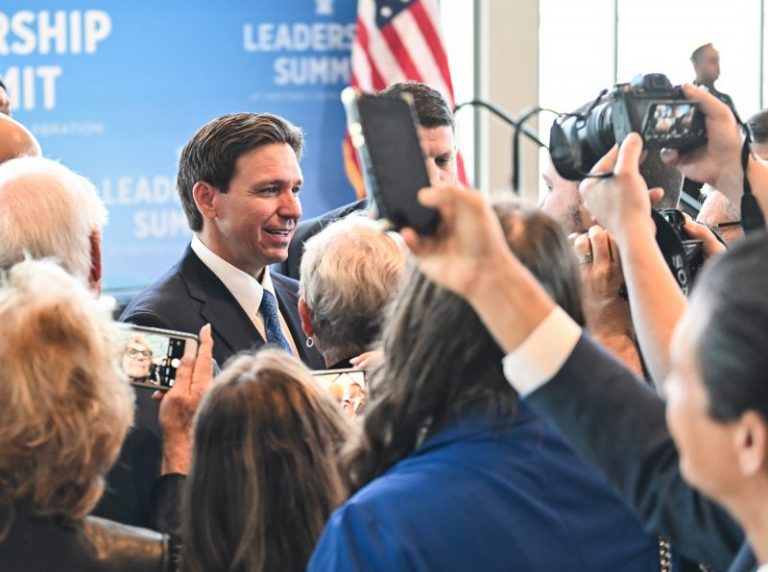You might want to take note of the following date: June 5, 2023. Because we might one day regard that as the date on which our politics very quietly crossed the Rubicon on AI-generated images.
Few people noticed until Thursday, but Florida Gov. Ron DeSantis’s campaign that day released a deceptive web video featuring fake images of Donald Trump hugging former White House coronavirus adviser Anthony Fauci.
While others have used artificial intelligence in their political messages before, this appears to be the first example of a major presidential campaign using it in such an obviously misleading fashion. And the DeSantis campaign is anything but apologetic about it.
The video, which the “DeSantis War Room” shared on Twitter, features six images of Trump and Fauci in the same frame. Three of them depict Trump hugging Fauci and appear to be AI-generated. One of those three features language on the White House sign behind the men that is gibberish — a feature of many AI-generated images. And if you look closely at another of the three, you’ll notice that Fauci doesn’t appear overly lifelike.
But most people won’t look nearly that closely. The vast majority will view them as very small images on social media, and they will view them only briefly as the video moves on. And many conservatives will believe that the video indeed shows real-life Trump repeatedly hugging their much-reviled Fauci. The video even overlays the words “REAL LIFE TRUMP” over the entire video.
Twitter added a Community Note to the video on Thursday, stating, “The 3 still shots showing Trump embracing Fauci are AI generated images.”
Sen. J.D. Vance (R-Ohio), who supports Trump, rebuked the DeSantis campaign on Thursday.
“Smearing Donald Trump with fake AI images is completely unacceptable,” Vance tweeted. “I’m not sharing them, but we’re in a new era. Be even more skeptical of what you see on the internet.”
A new era indeed. It’s not the first time we’ve seen what is apparently AI used in a major entity’s political content. But this one certainly moves the ball forward — or perhaps backward — when it comes to misleading with fake images.
In late April, the Republican National Committee turned heads by releasing a video using AI images of what it imagined the United States might look like during a second Biden term. But the images were disclosed as being AI-generated. And given that the thrust was a supposed future we haven’t yet realized, you could certainly argue it was less misleading to use fake scenes.
After DeSantis (R) entered the campaign two weeks ago, Trump promoted a video using AI-generated voices of the governor, Elon Musk and others, including a mock devil, “Adolph Hitler” and Dick Cheney. The video lampooned DeSantis’s glitchy campaign launch on Twitter Spaces. But the conversation was so ridiculous as to be obvious parody.
In response to criticism of the new web video Thursday, the DeSantis campaign played the whataboutism card and rather flippantly dismissed concerns about its deception.
It pointed to a fake image Trump shared on social media of DeSantis riding a rhinoceros (the implication being that DeSantis is a RINO, or “Republican in Name Only.”) The image looks a lot more like a crude photoshop than an AI image, though. It also seems much less likely to lead people to think it’s genuine. And even to the extent people believe it’s real, it would hardly be as damning as Trump hugging a much-hated figure on the right.
(We’ve seen before how such embraces with the wrong people can turn into political liabilities. Former Florida governor Charlie Crist once recounted his 2009 hug of then-President Barack Obama in a piece titled, “The Hug That Killed My Republican Career.”)
DeSantis’s campaign then posted another response: a video featuring obviously fake footage of an airplane flapping its wings. “Planes cannot actually dance,” it said. “That part of the video is NOT REAL.”
This is a day that has been widely predicted. The Washington Post and others in recent months have written articles about how the significant recent advances in AI meant such deception in political campaigns was surely around the corner.
The more likely avenue seemed to be outside groups with less accountability and connection to actual candidates. But here we have a campaign itself quickly going down this road without any compunction.
The question from here is how our body politic reacts to it.
A Democratic congresswoman has introduced a bill to require disclosure of AI-generated content in political ads. But agreeing on such legislation will be a tall task, especially given the Republican Party’s reluctance to regulate political campaigns and speech.
Beyond that, public condemnation like the kind offered by Vance could surely help police the issue. But we’ve also seen the destruction of a multitude of political norms during the Trump era, with the attitude particularly on the right increasingly being that all is fair in love and war.
The DeSantis campaign’s reaction is a byproduct of that, and it suggests the campaign has made a proactive decision to own its deception. The critics will be dismissed as oversensitive libs rather than those concerned about the consequences of this becoming our political reality.
In other words, don’t plan on this getting resolved in any kind of neat fashion. It’s on now. And people can accordingly judge those who declared open season.

